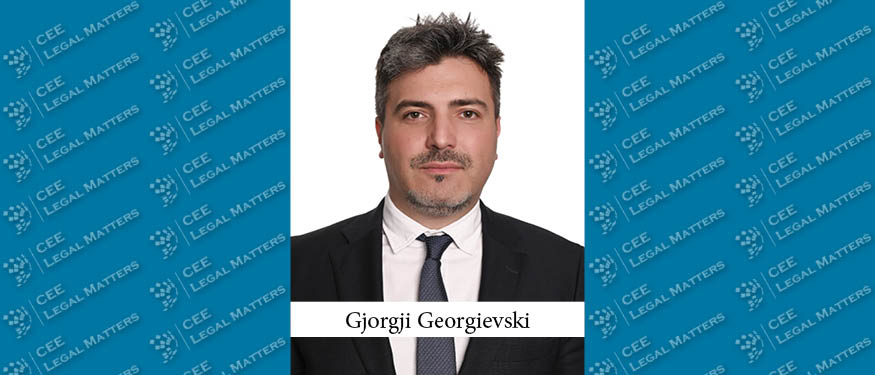Driven largely by fresh blood in its leadership, North Macedonia’s Commission for the Protection of Competition (CPC) has been noticeably more active in the past month, according to ODI Law Partner Gjorgji Georgievski. The stage has been set for rigorous enforcement and heightened consumer protection, redefining how market players navigate compliance in the country.
CEELM: How would you describe the current state of competition in North Macedonia?
Georgievski: The competition climate in North Macedonia is undergoing a significant transformation. With fresh leadership at the helm, the Commission for the Protection of Competition has shifted to a quite proactive stance. This change is not merely reactionary – it stems from a conscious decision to prioritize competition enforcement as a means to safeguard consumer interests. The new management’s willingness to actively seek out breaches has fundamentally affected market dynamics, making transparency and compliance far more important for businesses.
CEELM: What have been the most notable legislative developments in the area of competition law recently?
Georgievski: One of the landmark developments was the adoption of a new law on unfair commercial practices in agricultural and food products supply chains last year, in 2024. This legislation raised the compliance bar across several sectors, particularly impacting the agricultural and supermarket industries. For example, it mandates that companies engage in fair practices by ensuring written agreements and transparent disclosures of pricing, discounts, and rebates.
The law was enacted in response to widespread public concerns and now provides the CPC with a more detailed framework for initiating investigations, thereby reinforcing a culture of accountability and consumer protection. In fact, consumer dissatisfaction, fueled by substantially higher supermarket prices in the post-COVID-19 period compared to markets such as Germany, helped drive the urgency for this legislative move, giving the CPC additional wind in its wings to act decisively.
CEELM: What recent steps has the CPC taken to enforce competition and unfair commercial practices regulations?
Georgievski: Under the leadership of the new President, the CPC has undertaken a series of robust enforcement actions. There has been a noticeable uptick in activities such as dawn raids – in the supermarket sector, for example – where stringent checks are now a more common practice. Investigations into alleged collusion and price-fixing have also expanded into areas like insurance and real estate. In the insurance sector, rising prices – seemingly exceeding what can be explained by simple inflation – have prompted the CPC to investigate further, while in real estate, a combination of steady supply and surging prices has attracted closer scrutiny.
Moreover, given the close interrelation between the real estate and banking sectors, where banks finance commercial and residential developments, the commission might soon be incentivized to extend its focus to banking as well. Importantly, this intensified activity is a reflection of the new President’s initiative – it is not so much driven by external pressures as it is by a deliberate change in the authority’s approach to actively policing the market and ensuring compliance.
CEELM: What are the main challenges businesses encounter under the current competition law framework?
Georgievski: Businesses are now having to scrutinize every facet of their commercial operations to ensure adherence to the new compliance standards. The primary challenge lies in re-evaluating how contracts are formed, how communications with suppliers are handled, and in reviewing existing procedures that may inadvertently fall into a regulatory “grey zone.” For large market players especially, where a single misstep can lead to severe penalties, the push toward comprehensive, integrated compliance programs is both a necessity and a significant operational challenge.
A key factor moving forward will be the extent to which the CPC enforces substantial penalties. If the market begins to see hefty fines – up to 10% of a company’s global turnover in the past year, a notable increase from the previously more lenient regime – we can expect to see companies investing substantially more time and resources to leave no stone unturned in their compliance efforts. Moreover, it is imperative for major market players – capable of distorting the market with a single misstep – to implement bulletproof compliance programs that are fully integrated into every aspect of their operations.
CEELM: Looking ahead, what changes or trends do you anticipate in the regulation or enforcement of unfair commercial practices in North Macedonia?
Georgievski: I expect the trend toward active enforcement to not only continue but to broaden its scope. Beyond the current focus on supermarkets, insurance, and real estate, sectors such as electricity trading, manufacturing, telecommunications, and even banking could soon come under stricter scrutiny. Given that North Macedonia’s markets are relatively small and dominated by a few large players, the potential for collusive behavior is significant. The CPC is likely to monitor key market players closely to ensure that coordinated actions do not manipulate market realities.
Should ongoing investigations substantiate claims of collusive behavior in any of the sectors the CPC is currently targeting, we might see fines that are notably more severe than those imposed in the past. Essentially, this zero-tolerance approach will be a cornerstone in shaping market behavior and will urge businesses to elevate their standards of compliance permanently.
CEELM: Based on your experience, what practical advice would you offer to businesses trying to navigate competition requirements in North Macedonia?
Georgievski: My advice to businesses is clear: proactively develop and rigorously enforce a comprehensive compliance program. This involves a meticulous review of existing processes and contractual agreements as well as an ingrained commitment to transparency and ethical business practices. The new leadership of the CPC recognized the need for a more assertive stance – a decision that, in turn, demands that companies adapt swiftly. By integrating robust compliance measures into every aspect of their operations, businesses can better safeguard themselves against regulatory breaches and the substantial penalties that accompany them. Moreover, if substantial penalties become the norm, companies should be prepared to invest even more time and resources to ensure that their compliance programs are bulletproof and seamlessly integrated across all operational levels, thereby preventing any potential market distortions.
This article was originally published in Issue 12.3 of the CEE Legal Matters Magazine. If you would like to receive a hard copy of the magazine, you can subscribe here.






















